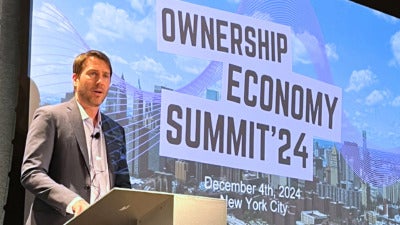
 On December 4, 2025, the Aspen Institute, together with its partner Prudential Financial, was proud to co-sponsor the second annual Ownership Economy Summit, a gathering of leaders in New York City who are working on innovative ownership models that can reshape industries, drive sustainable growth, and empower communities. We were inspired by the opening speech made by Partner and Co-Founder of the Ownership Economy platform, Martin Smith, and we are pleased to share his words with the broader Aspen community here.
On December 4, 2025, the Aspen Institute, together with its partner Prudential Financial, was proud to co-sponsor the second annual Ownership Economy Summit, a gathering of leaders in New York City who are working on innovative ownership models that can reshape industries, drive sustainable growth, and empower communities. We were inspired by the opening speech made by Partner and Co-Founder of the Ownership Economy platform, Martin Smith, and we are pleased to share his words with the broader Aspen community here.
Good morning, everyone. It’s an honor to welcome you all to the 2nd Annual Ownership Economy Summit 2024. To all the entrepreneurs, investors, innovators, policymakers, leaders, and changemakers here today—thank you for joining us. To our sponsors—including the Aspen Institute, Prudential, Filecoin Foundation, Near Foundation, Plural Energy, Gary Community Ventures, CommonShare, and Cerulean Ventures—thank you for helping to make this happen.We gather at a pivotal moment in history. Never have we seen such a concentration of wealth and power in such a small group of people. We have often faced pivotal moments where, as a society, we must decide whether we believe in the right to decent work and quality of life for all.For too long, this debate has been defined by isms—communism versus capitalism, socialism versus liberalism. But these labels often oversimplify the complexities of our modern world. Instead of clinging to rigid ideologies, we ought to focus on practical solutions that address the real challenges we face today—like income inequality, climate change, biodiversity loss, concentration of wealth, and political polarization. It’s time to move beyond binary thinking and embrace a more nuanced approach that combines the best elements of different systems to create a more equitable and sustainable future. The reality is that the hard work and choices of the next decade will not be black and white but fought in shades of gray.Stark choices make decision-making easier. Vilifying the rich, decrying redistribution through taxes, the politics of right versus left—these are all oversimplifications. Each of us is more than one thing. We work as employees and consultants and have pensions and investments. Some of us take higher risks through angel, venture, and private equity investments. Many of us own homes and other real assets. And despite differences in where we grew up, we share common concerns.At the heart of our post-capitalist economy is a common reality of fear: fear that we will not have enough, that our children may not have the opportunities we had, that our elders will grow old without dignity, that the quality and abundance we grew up with will wither amidst increasing division and declining resources.The path to economic resilience and abundance begins by shedding our labels and embracing the common values that we hold true. No matter how jaded the businessperson, almost all would agree that those who work hard should be entitled to a decent life.This path is nurtured through the recognition that all of us are better when we do not have our backs against the wall. Our best selves are manifested in moments when our fear subsides and creativity is able to flourish. Our collective humanity requires that our individual needs—including the need for security about both the present and future—can be met.Who owns what and how they manage that ownership will define whether we make this planet a thriving place for all or a quickly dying place that only works for the elite few. Time is scarce, and the next decade may be our last chance to shift our model of collective prosperity.First, let’s acknowledge the transformative power of technology. Those who are doing well in today’s economy have all embraced technology. Advances in artificial intelligence, blockchain, and renewable energy are reshaping our world. But with these innovations come responsibilities. Data ownership, access to technology, and the benefits of a green economy should not be privileges reserved for a few; they should be rights accessible to all.A resilient economy must be embedded within society. If technological innovation is a core pillar of such a society, then such innovation must be pursued while simultaneously managing the boundaries imposed by a finite world, such as climate change and biodiversity loss. To that end, a world that only prioritizes the discreteness of binary code loses out on the integral abundance that defines what it means to be human.At the heart of managing these tensions between growth and distribution is a call to reimagine how businesses operate. And that requires being honest with ourselves—we are no more good or evil than our neighbors. Our capacity for greatness is as much due to circumstance as it is to anything we are innately born with.As such, a resilient economy relies on us crafting smart incentives and organizational structures that reward those who participate, steer, and contribute value—both quantitative and qualitative—to the firms and ecosystems that define an abundant society. It smiles knowingly at pithy statements about hope and vision, recognizing that the hard work of building a resilient society relies on organizational, economic, technical, legal, and governance innovation.That is the hard work that the folks in this room are here to do today: to cross bridges, boundaries, and ecosystems to build what can be the tip of the spear in defining the economics of the next decade.Throughout this summit, we’ll hear from experts who are leading the way. We’ll dive into how we can finance the green energy transition equitably. We’ll explore practical steps for implementing steward ownership in businesses. We’ll discuss the critical intersection of data, AI, and equity.I encourage each of you to engage fully, ask challenging questions, and think creatively. The ownership economy isn’t just a concept—it’s a movement toward a future where prosperity is shared, and everyone has the opportunity to succeed. Jahed, Alex, our sponsors, advisors, and I have brought this as far as we can, but what grows from this seed will be defined as much by this community as by us.In closing, let me say that while the obstacles are real, so is our ability to overcome them. Together, we can build an economy that works for everyone—an economy where ownership and opportunity are not exclusive but are the foundations of our collective success.Thank you for being here. Let’s get started.

